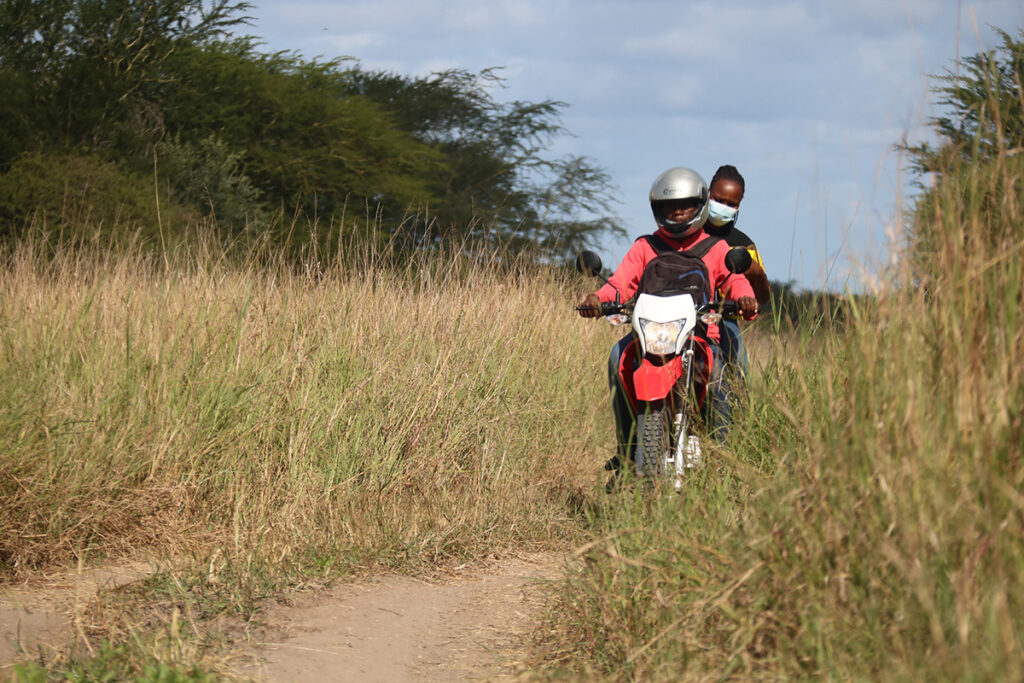
Care in the community, one stop at a time
Nurse Milagrosa Matsinhe’s first stop today is to check in with Lurdes Ubisse at her home. But first, she has to get there. Meeting clients where they live means taking a motorbike, driven by a colleague, through grasslands near the Chokwe Military Health Center in southern Mozambique, where Milagrosa is based. Late last year, Lurdes began experiencing abdominal pain and sought help at a nearby health center. She was diagnosed with an advanced precancerous lesion. Lurdes was immediately referred to Chokwe Rural Hospital, where she underwent loop electrosurgical excision procedure (LEEP) to remove abnormal tissue.

“Lurdes’ journey didn’t end after [the LEEP procedure]. Since there is limited transportation to the health center, I regularly visit her home for follow-up examinations,” says Milagrosa. In February 2024, during one of her visits to Lurdes, Milagrosa performed a cervical cancer screening test using visual inspection with acetic acid. The result was encouraging: the test was negative. Lurdes was free of the disease.
“I want to help women care for their health so they can see their children grow to adulthood. I do my work for love.”
Lurdes could not be more thankful. “Milagrosa always calls to find out how I am getting on and visits me whenever she is in the village,” she said. “She treated me so well that I entrusted her with my health and invited my cousin to be seen here at home.”
So during a subsequent visit, Milagrosa screened Lurdes’ cousin, 33-year-old Essineta Ubisse, and identified signs of early-stage precancer. Thanks to early intervention, Essineta was quickly treated with thermal ablation—a procedure, less invasive than LEEP.
Updating cancer screening skills
While cervical and breast cancer screening is part of the training package for maternal and child health nurses at all levels in Mozambique, in 2022, Milagrosa attended a refresher training led by Jhpiego on cervical cancer screening procedures and performing thermal ablation for those found with precancerous lesions. Jhpiego has provided refresher training to 16 nurses in 11 provinces across Mozambique.

With funding from the U.S. President’s Emergency Plan for AIDS Relief (PEPFAR), through the U.S. Department of Defense HIV/AIDS Prevention Program, which serves Mozambique Defense Forces and communities surrounding military sites in 11 provinces, and with technical support from Jhpiego, Milagrosa has adopted an innovative approach by providing care directly to women in their homes. (Mozambique has a high HIV prevalence rate, women living with HIV are six times more likely to develop cervical cancer than other women.) Dr. Lisete Amélia Macaringue, Country Director of Jhpiego Mozambique and Chief of Party for the project says, “This is an innovative strategy and Chokwe is the first place to take this [home visit] approach, which is bringing good results and reducing the cost of women traveling long distances to receive treatment.”
Jhpiego Mozambique is advancing cervical cancer prevention.
Jhpiego Mozambique is supporting 1,690 health units with cervical cancer screening and treatment services. These joint efforts, along with Mozambique’s Ministry of Defense and the Ministry of Health, are changing the future for hundreds of women, and their families, giving them a new lease on life and contributing to the World Health Organization’s aim of eliminating cervical cancer as a public health problem by 2030.
According to the most recent Global Cancer Observatory study, cervical cancer was the most common cancer among Mozambican women aged 25 and over, accounting for 40 percent of new cases and deaths from all types of cancer. In 2020, it was estimated that there were 5,325 new cases. Mozambique is one of the 10 countries with the world’s highest rates of new cases and deaths of women from cervical cancer.
Veronica Reis, Principal Technical Advisor, Family Planning & Reproductive Health, provided a technical review of this article.
Manuel Jesus Joaquim is the Senior Communications Advisor in Jhpiego Mozambique.



